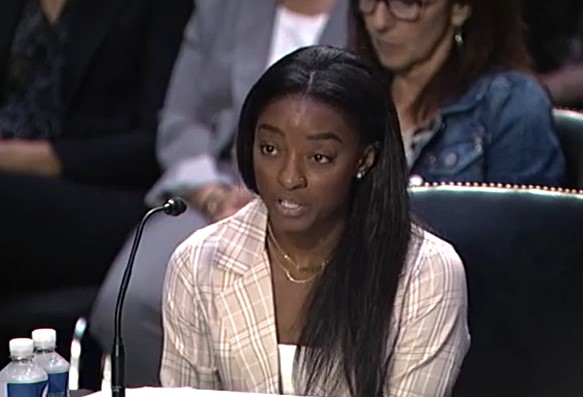Iowa lawmakers address Olympic athlete abuse, poultry processing
August 3rd, 2024 by Ric Hanson
(Iowa Capital Dispatch/ Washington, D-C) – Iowa Sen. Chuck Grassley penned letters this week to SafeSport and USA Gymnastics demanding answers to why the agencies have done so little to protect Olympic athletes. The Iowa Capital Dispatch reports also, Iowa lawmakers also introduced bills aimed at increasing small-scale poultry processing, reducing paperwork for small businesses and preventing sexual assault on college campuses. Here’s what Iowa’s congressional delegation was doing in the last week before a month-long recess:
Grassley calls on SafeSport and USA Gymnastics to protect Olympic athletes from abusers
Grassley sent letters to the CEOs of SafeSport and USA Gymnastics demanding they take greater steps to protect Olympic athletes from abusers. His letters come amid the 2024 Paris Summer Olympics. Olympic gold medalists Simone Biles and Aly Raisman testified in September 2021 before the U.S. Senate Judiciary Committee about failures that enabled the sexual abuse committed by the former USA Gymnastics team doctor, Larry Nassar. SafeSport, a government agency designed to investigate Olympic athlete abuse, and USA Gymnastics can provide protective measures against individuals who are under investigation for the alleged physical or emotional abuse of athletes, according to Grassley. However, an internal SafeSport report revealed the agency only imposed protective measures on 5% of individuals under investigation.
To USA Gymnastics CEO Li Li Leung, Grassley is asking for data on the number of times they imposed restrictions due to SafeSport investigations, declined to impose restrictions from a SafeSport investigation, internal policies on when they will impose a restriction and policies for an athlete to request restrictions against an individual. Grassley brought up allegations of USA Gymnastics ignoring reports of children being slapped, dragged by the neck and kicked while the child was injured. To the SafeSport CEO, Grassley asked why the agency has decreased its use of protective measures, what efforts the agency has made to inform governing bodies what they can do amid a pending investigation as well as what metrics are used to assess the seriousness of an allegation and the risk posed by an individual. Grassley said in the press release that SafeSport delaying or avoiding punishments of alleged abusers despite numerous warnings of their danger shows the agency needs change.
He also asked for data on the number of protective measures taken since June 2020, how long have the 120 cases opened for more than two years been pending investigation and how many times has the agency eased restrictions placed on individuals by national governing bodies.

Olympic gold medalist Simon Biles testifies Sept. 15, 2021, before the U.S. Senate Judiciary Committee with fellow gymnasts about sexual abuse by Larry Nassar, former USA Gymnastics doctor. (Screen shot from U.S. Senate livestream)
Feenstra seeks an increase in small-scale poultry processing
Rep. Randy Feenstra introduced a bill to allow poultry processing plants to perform regular slaughter and custom exempt slaughter at the same facility. Custom exempt slaughter allows livestock owners to operate without federal inspection if the slaughter is exclusively for the use of the livestock owner or the owner’s family, guests or employees. “Due to outdated laws, Iowa farmers oftentimes travel long distances to have their broilers and turkeys slaughtered and processed – this must change,” Feenstra said in a press release. “By encouraging local processing and slaughter of poultry, we can deliver fresher products more quickly to consumers, eliminate unnecessary headaches and additional expenses for our producers, and strengthen our agricultural economy in Iowa.” If passed, the bill would amend the Poultry Products Inspection Act which would allow poultry producers to increase the availability of local poultry processing options.
Nunn bill would exempt small businesses from new reporting law
A bill introduced by Rep. Zach Nunn would exempt small businesses from the reporting requirements of the Corporate Transparency Act. The Corporate Transparency Act is designed to root out shell companies operating outside of the country, however, Nunn said in a press release that the U.S. Department of Treasury’s Financial Crimes Enforcement Network (FinCEN) failed to adequately notify small businesses of the change. FinCEN Director Andrea Gacki said in a small business roundtable that only 2 million out of over 32 million small businesses had filed the new reports, according to Nunn’s press release. A survey conducted by the National Federation of Independent Businesses revealed that 80% of members had never heard of new requirements. Nunn said in the press release that changes are needed to remove unnecessary red tape for small businesses and protect small businesses from fines and potential jail time for failing to adhere to the reporting requirements. Failure to complete the reporting requirements will result in a $591 fine daily and up to two years in jail, according to the press release.
Grassley, Gillibrand push for bill to combat campus sexual assault
Grassley and New York Democrat Sen. Kirsten Gillibrand reintroduced a bill aimed at ensuring access to sexual assault prevention and education resources on college campuses. The bill, known as the Campus Safety and Accountability Act (CASA), would require colleges on their website to post campus safety policies, an annual security report, instructions for filing a complaint and data on sexual misconduct allegations on campus. “Our bill is a coordinated approach to addressing incidents of sexual assault on college campuses. It would inform university protocols for handling reports, while also strengthening recovery resources for survivors and empowering them to know their rights,” Grassley said in a press release. CASA would also provide more protections from university punishments when students’ reports include uses of self-defense, drugs or alcohol.
The bill also requires universities to name specialists who would act as confidential aides for survivors and expand the Violence Against Women Act’s campus grant program to address sexual harassment on campus.





